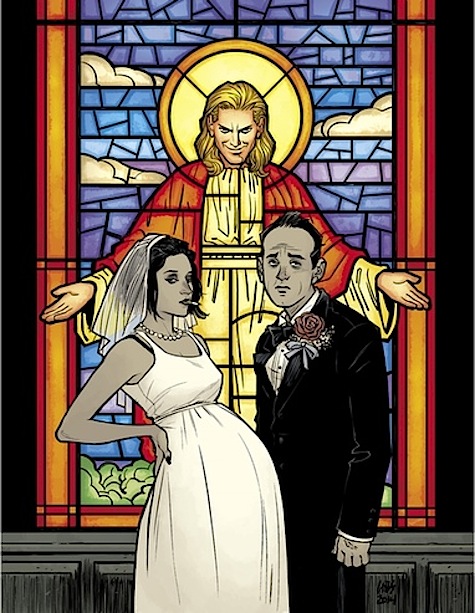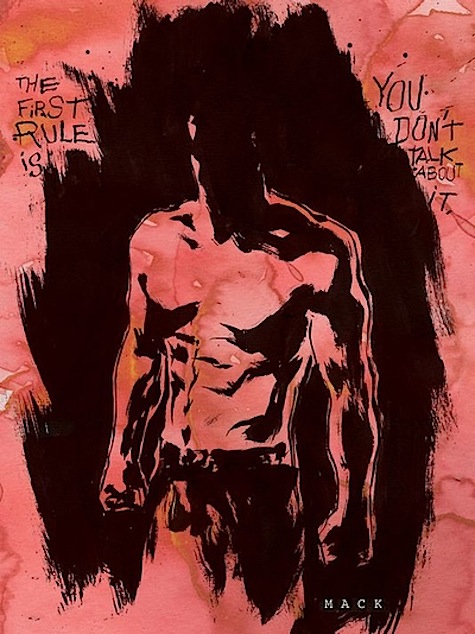The news that Chuck Palahniuk was authoring a sequel to Fight Club—in comic book form, no less—was one of the big pieces of news that blew up right before San Diego Comic-Con this year. Palahniuk’s signing events at the con were hugely popular, and his Saturday night panel was jammed. I was able to attend the panel, where Rick Kieffel moderated a kind of oral history of the film, and the comic book sequel with Palahniuk, his longtime editor Gerald Howard, director David Fincher, Dark Horse Comics editor-in-chief Scott Allie, and artists Cameron Stewart and David Mack. And the next day, I sat down with Palahniuk to talk about Fight Club 2, with a brief aside to his new novel, Beautiful You.
The novel Fight Club only sold about 5000 copies, according to Palahniuk, and the rest of the print run might have been pulped if it hadn’t been for the Fincher film encouraging the publisher to get the copies back into circulation. That the film was no great financial success is a well-known story, as is the disastrous marketing campaign that Fincher still regards with chagrin—he recalls the head of marketing saying “You’ve found the perfect nexus—men don’t want to see Brad Pitt with his shirt off and women don’t want to see fighting.” But it went on to become a hit on DVD and a cultural touchstone of the late 1990s/early 2000s, and now Palahniuk has written the comics script for a 10-issue series to be drawn by Cameron Stewart (Sin Titulo, Seaguy), with covers by David Mack (Kabuki). Unusually, most of the script has already been completed.
In regard to Dark Horse’s involvement, Scott Allie said that at a previous comics convention, Palahniuk had mentioned that he was interested in doing a Fight Club comic and had been talking to various publishers—including Dark Horse. Allie, startled, began asking around about who was talking to Palahniuk; it turned out that Palahniuk had met a number of comics creators in Portland, OR, including Matt Fraction, Kelly Sue DeConnick, and Brian Michael Bendis. DeConnick had a book at Dark Horse at the time—and that apparently counted as “talking to Dark Horse.” Allie met with Palahniuk, and before long he found himself holding “a bag of dynamite”—the script for Fight Club 2.
Stewart, after submitting an “audition” piece—an adaptation of a chapter near the end of the original novel—was brought on as artist. Stewart’s work appealed to Palahniuk for “a kind of angularity, an oversized-head quality to his characters, a cartoony quality that would give me some wiggle room in depicting things that were really, really horrific.” Stewart added that “the dark, horrific stuff works better when it’s contrasted with a cartoon presentation … when it comes from a more stylized approach, it’s extra-jarring.”

Later, Palahniuk expanded on the aspects of Stewart’s work that appealed to him. “It seemed very punk culture, and I thought it had kind of a touching quality, and that was something I wanted in the book, was to make Marla as big a character as Tyler and the Narrator, so that at least half of the story would be run by Marla, and that there’d a lot more emotion in the book than there was in the movie.”
The movie being the cult classic that it is, it was natural to wonder if any of its look influenced the look of the comic. “In Cameron’s layouts I don’t see a lot of similarity or homage to the look of David’s film, because I wanted to get back to how I had envisioned the characters who are based on friends of mine,” Palahniuk said. “So Tyler, for example, has kind of shoulder-length-Jesus blond hair, because he’s based on a friend of mine. And Marla is 10 years older, and she’s also kind of shellacked and waxed into this matron she hates being, so she’s not very much like Helena Bonham Carter’s character. So the look of the book I think is going to be very different from the look of the film. But it is going to incorporate some kind of other reality gimmicks in the same way that David had the subliminal flashes of things in the film, so there will be these kinds of surface effects that break the pages and kind of reinvent the layouts, things overlaid on the pages, like relics of sorts, that seem more of the real world than of the comic world.”
Of Marla’s larger role in the sequel, Palahniuk described her as having been “a resource that I was not using to its fullest extent.” The movie, as Fincher pointed out in the panel, was very much inside the narrator’s head, such that even cutting to Marla on the other end of the phone was a choice that had to be considered carefully. In Fight Club 2, Palahniuk embraces the “devices that transcend the cinematic” offered by the comics medium. “And instead of having the narrator in every scene, which is what the movie was kind of condemned to, the graphic novel could cut between characters and we didn’t always have to follow the narrator, we could go to scenes where he was not, and those would be scenes with Marla.”
Our discussion of Marla led to a brief conversation about Beautiful You, which tells the story of Penny Harrigan, a low-level gofer in a big Manhattan law firm who is swept off her feet by multibillionare C. Linux Maxwell. Maxwell charms and seduces Penny, bringing her to new heights of sexual pleasure—and also makes her the latest test subject for the Beautiful You line of sex toys, which is just the first stage in a sinister plan for world domination.
“The working title was originally Fifty Shades of the Twilight Cave Bear Wears Prada,” Palahniuk said, “because it borrowed from all of those big books in a kind of mash-up way.” Penny herself is introduced in an over-the-top scene of romance-heroine clumsiness, and her roommates are outrageously bad ethnic stereotypes, because “in all of those movies, the roommate or the best friend who’s almost as pretty … but in an ethnic way, so I just wanted to put it all out there.” It’s darkly funny and surprisingly moving, and for all that it’s packed nearly wall-to-wall with sexual acts, it’s so outrageous as to be almost completely unsexy. And though it’s not part of the world of Fight Club, its satirical examination of early 21st century femininity and capitalism dovetails with Fight Club‘s examination of masculinity and consumer culture.
Fight Club 2 will be published by Dark Horse in May 2015, and Beautiful You arrives in October 2014.
Karin Kross is at her sixth San Diego Comic-Con. She can be found elsewhere on Tumblr and Twitter, and she, her husband Bruce, and her friends Shellie and John are posting about SDCC at nerdpromnomnom.










